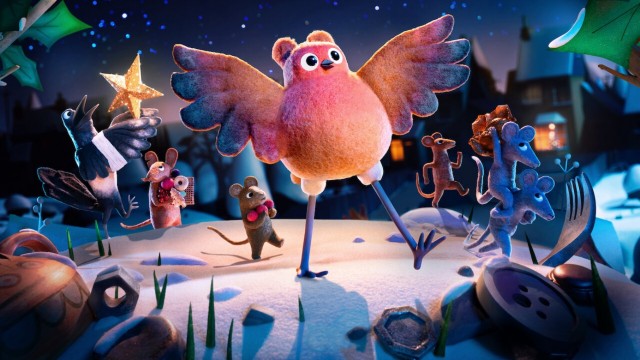Having followed the work of Mikey Please (The Eagleman Stag, Marilyn Myller) and Dan Ojari (Slow Derek), since they were fresh-faced students at London’s Royal College of Art, there was genuine excitement around the Short of the Week HQ when we discovered they were making a Netflix Christmas special with Aardman. Eager to find out more about the process of getting their 30-minute stop-motion Robin Robin made, we tuned into the Manchester Animation Festival’s ‘Making of‘ and ‘Q&A‘ sessions with the co-directors, for some genuine (and very funny) insight into the production.
“We were in the stage of coming up with ideas to put on the board and the idea of making a Christmas special seemed like a really fun project to do”, Ojari explains when quizzed about the origins of Robin Robin in the live Q&A. He thinks that original spark came around eight years ago and says the duo were drawn to the appeal of the 30-minute Christmas special because they loved the tradition – which he feels is like indie animation hustling its way into a family’s annual routine – but also found it an achievable goal in terms of pushing their filmmaking.
From here, they came up with the basic premise of a Robin (which was initially suggested by Ojari’s wife) who was raised by a family of mice. Taking this idea, they developed it by retelling the story verbally to others (usually around Christmas time) and found this process really helped to crystallise their narrative, which they eventually put into storybook format and took to Annecy festival, along with a script and some sketches.
Presenting the idea to Sarah Cox, Executive Creative Director at Aardman, at a very impromptu meeting (where they even sang her a song from their potential film) in the corner of the canteen at the festival, the pair didn’t even know she was at the event looking for a Christmas project when they initially spoke to her. Cox was obviously taken with the premise of Robin Robin, with Ojari admitting it felt like she “saw the project the same way we did”, and provided the pair with an opportunity to discuss the project with Alexi Wheeler, Director of Kids and Family Content at Netflix, who then “championed” the project until its completion.
Now the project was greenlit and Aardman had come onboard, the co-directors started the journey of bringing Robin Robin to the screen, admitting it was a steep learning curve, with Please jokingly admitting “they knew nothing” of how it all worked at the start of their process. The first task was fleshing out the story and making sure there was a message and a journey, which Ojari admits included “so much work and so many iterations and redraws and scrapping of ideas”, before Please (rather poetically) describes the final output as “the tip of the iceberg is the bit that makes it through, but it’s built on a pile of corpses”.

Robin Robin’s “handmade” aesthetic is a blend of needle felt characters and “carved, folk-art” backgrounds and props.
With the story in a good place, Ojari and Please began to work on the visual side of the film and collaborated with illustrator Matthew Forsythe, who worked to design the characters and the overall look of the film – which Please says they wanted to feel was “grounded in a world of illustration”. The filmmakers then translated those into three dimensions, knowing that they always wanted the characters to be needle felt, they tested a lot of materials for making the Robin Robin world, before opting for a “carved, folk-art” look.
Although lockdown delayed production, the pair say this break allowed them to really put the focus back on the story, so they were ready to jump back into the hands-on work, when the time came. This pause allowed them space to step back and revisit some of the work they already started and where the pandemic has probably derailed a lot of potentially great projects over the last couple of years (or so), with the support of Aardman, it feels like this extra time really allowed Ojari and Please to fine-tune their characters and narrative.
Robin Robin is a magical Christmas tale and where a lot of that festive spirit is carried through the storyline, the short carries all the wonder of stop-motion you’d expect to find in an Aardman production. The duo wanted the film to come across as very tactile and “handmade”, with every element looking and feeling like it had been crafted, and there’s certainly that wonderful feeling with the needle felt characters, where you want to reach through the screen and give them a stroke.
A talented crew at their disposal, the pair were in the position of taking a less hands-on role in the making of their film, something they both struggled with at times after feeling strong urges to meddle with the puppets and props throughout production. Ojari admits he couldn’t help but move a spoon “for composition” and Please describes the process as “an awkward thing”, before adding that “on the one hand, you want to be hands-off, but on the other hand on all of these small projects we’ve been so involved in every little aspect of it, it’s really hard to let go of the details. Ultimately you have to because of the scale of things, but I would say just naturally, every opportunity we had to get pernickety and step on people’s toes, we probably did”.
With Robin Robin now released on Netflix and looking to get everyone in the festive spirit, Ojari and Please are free from the world of never-ending Christmases and the pair are now looking to bring some of their other projects “back out the development fridge, dethaw them and put them back on the simmering pot of creative development”.
 Rob Munday
Rob Munday